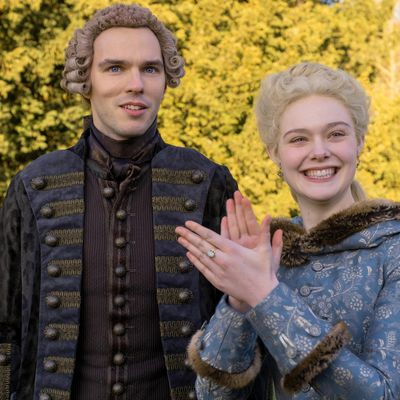
The best things about The Great are also the most contradictory and the most uncomfortable. In some moments, Hulu’s new satirical period drama, starring Elle Fanning as Catherine the Great and Nicholas Hoult as Emperor Peter, feels primed to slide too far in one direction or another. Sometimes it sloshes gently toward laudatory opulence; occasionally it overcorrects toward finger-wagging righteousness or even, at times, cruelty. But the show really shimmers in the spaces where those moods collide. There’s some messy, appealing dissonance between The Great’s empathy for its royal protagonist and its simultaneous impulse to slice her to shreds. Containing both of those things without letting them undermine each other is The Great’s best and richest feat.
There are noticeable similarities between The Great and The Favourite — which was also written by The Great’s creator, Tony McNamara — especially in some of The Great’s cruelest, pointiest scenes. The wealthy world of The Favourite was shot with an eye toward emphasizing its grungy, frigid, puss-filled humanity, and the razor-sharpness of its satire came hand in glove with its visual style. The Great is different. There’s an uneasy, sometimes unstable, sometimes glorious dose of fluffy, breathtaking beauty that comes with its horrors, and there’s more than a little of Sofia Coppola’s lovely Marie Antoinette in its DNA. It’s a show full of satin and blood and excrement and ornamental feathers, sometimes all at once.
Take, for instance, the scene in which Catherine goes to comfort Russian soldiers, mired in a futile war against Sweden. She rides out to a battleground, hoping to bolster everyone’s spirits and offer them some aid. When Catherine gets there, she’s surrounded by mud and corpses, and she strides through the camp dressed in a fur-trimmed gown and carrying a massive box of macarons, trying to offer them to the wounded. One particularly bloody soldier explains that he can’t take the cookie from her because he “has lost [his] fingers.” “Oh, I’m so sorry,” Catherine says. “I’ll just … pop it in your mouth? It’s pistachio, if that’s helpful.”
On its own, it’s a nice moment of funny-sad monstrosity. Catherine, useless, wanders around wearing calfskin gloves in a war zone, doing a Catherine the Great rip-off of “let them eat cake,” and the message is clear and painful. She’s a clueless, sheltered aristocrat without any practical knowledge, climbing to power on a mountain of dead Russian citizens. Nothing The Great says about Catherine before or after that scene is meant to soften those characteristics in her. She’s naïve and power hungry. She also immediately recognizes those things about herself, and does honestly try to get better. She’s galvanized by the macaron incident. She’s furious and frustrated. She swears to herself that she’ll work hard to make Russia better than this, and she really tries. The Great’s skill is in how well it manages to demonstrate empathy for Catherine, and even some for the truly monstrous Peter, without losing sight of how horrible they can be.
It helps that the performances are solid, and that Fanning’s sense of comic timing is so good. Hoult as Peter is even better; Peter’s built on a groundwork of sociopathy and childishness and very occasional detours into real despair. His tic of saying “huzzah” at the beginning or end of any thought starts out sounding like a catchphrase — and Hulu’s used it on the promotional materials for the show. But Hoult’s so good at those huzzahs. He can turn them into questions or declarations or threats at will, and what could so easily be a totally obnoxious running joke instead becomes something like a perfect distillation of Peter’s character. The only way he knows how to think about the world is via a celebratory announcement; even when he’s mourning or murdering, he’s still cheering.
The Great is, however, too long — a complaint about streaming series in particular that’s become so common I almost hate to make it again because it feels like such tired, whining ground. “It’s a fantastic show, but I wish there were less of it!” is an argument that barely even scans. In this case, though, it’s not just a case of Great-ness fatigue (although there is that, too). The show’s so good at sketching Catherine’s arc, from pure naïveté to disillusionment to gradual revolutionary, and its most striking scenes come out of the combination of Catherine’s honest sincerity and the show’s bleakly comedic tone. All of it is muffled by The Great’s excessive runtime. Catherine’s story feels meandering and less weighty than it should. In some of the earlier episodes, Peter and Catherine’s relationship has a boggy shapelessness. On a show that’s so much about excessive luxury and pointless wealth, its narrative excess may be purposeful. But that doesn’t mean it’s a good idea.
Aside from the issues of its length, though, The Great pulls off the trick of its own internal contradictions. It is fun, somehow, which is extra impressive amid so much torture and death and critique of aristocratic privilege. It’s also not historically accurate, and it’s not trying to be. The series puts an asterisk right onto its title card; it’s an “occasionally true story,” and while that may bother some viewers who prefer their period histories to be full of proven facts, there’s never been a better argument for putting artistic sensibility over devotion to the historical record. The show’s Catherine the Great may not have much at all to do with the real woman, but she and Emperor Peter come alive anyhow. They’re true to The Great’s vision of them, even though the details are all made up.
Want to stream The Great? You can sign up for Hulu here, or as part of a bundle with Disney+ here. (If you subscribe to a service through our links, Vulture may earn an affiliate commission.)





